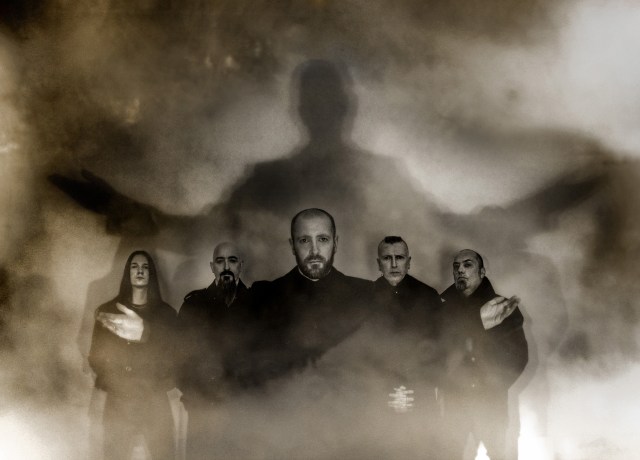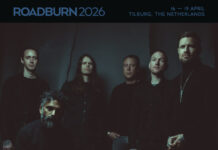Over the last 32 years, the British Gothic metal legends of PARADISE LOST have proved themselves to be one of the most resilient acts in British metal. Having always reinvented themselves with every album and not sticking to a certain formula, the band is now ready to release their new album, “Obsidian,” on 15 May 2020 through Nuclear Blast. We had the opportunity to talk to frontman Nick Holmes about the upcoming release. Read the complete interview here.

First of all, thanks for taking the time to do this interview, how are you doing in these scary times?
Nick: Thanks, I’m okay. I spend a lot of time at home usually when I’m not on tour, so it’s not that different for me really, but it’s kind of weird when you go to the supermarket, for instance, and everyone is a bit nervous and weird. We just try to get through it and it’ll hopefully get back to normal as soon as possible.
You’re releasing your new album “Obsidian” in May. How are you feeling about the upcoming release?
Nick: We’re really looking forward to seeing people’s responses. We released the first song, “Fall From Grace,” and everyone seemed to really like it. We thought we might as well stick to the normal release date, there is no point to delay it. Everyone is at home now, so everyone could listen to it. Playing live is something else, that’s another hurdle to get off. As far as listening to music, we can all still do that so there was no point to delay it.
I noticed that a lot of people were reacting very positively to your latest single, “Far From Grace.” Why did you pick that one as the lead single?
Nick: Everyone involved decided which one of the songs would be the first single. We stopped writing “singles” years and years ago because it just detracts from the actual album, really. We just try to write albums, I’d say we’re very much an album band. When you’re told to write singles it’s far too contrived, so we kind of quit that many years ago. For picking the singles, it’s just a case of what everyone thinks and then we just go with the majority.
What really caught my attention in the album is that it’s so diverse, which is also why I asked why you picked that song. Was there anything different about the writing process, or did you guys have the same as usual?
Nick: We wrote the album the same way we usually write it. Every album, for as long as I can remember, has been written in a similar way. That specific song is the closest to the last album because it was the first song we wrote, so therefore it’s in a similar vein of “Medusa” I think, but it’s the only song that is somewhat similar. We didn’t want to do an album exactly the same as the last one, you know, “Medusa” was a very specific doom/death album; this one has more elements to it than just that, but it’s also still very heavy. I personally think it’s a darker album than the last album. It’s more interesting for everyone to keep a certain variation on each album. Hopefully, all the people will be interested in it as well.
What I also really liked about “Obsidian” is the order of the tracks as there was a really nice flow to it. How did you decide on the order? What were you trying to achieve with it?
Nick: We usually think of albums as in the old vinyl days, so there’s an A-side and a B-side. We decide which one is the first one on the A-side and the first one on side B. We always think about it that way when we release music. I don’t know how younger bands do it because they don’t have that anymore. I’m interested to see how they do it. (laughs) I tend to listen to the last 30 seconds of each song and see which one goes best into it next. We definitely think about the running order for sure, then it makes it feel more like a complete album as opposed to just random songs put together, so yeah, that’s important for us. As we’re very oldschool, the A-side and B-side way is a good way of doing that I think.
What would the last track of the A-side be, out of curiosity?
Nick: It’s hard to say actually, I’m just looking at the tracklist now. You could do “Serenity,” it makes a very good first song on the B-side.

I think one of the songs, “Ghosts,” feels like a really catchy 80s Goth-rock song. To me, it stood out in a fun way – what was the process behind it?
Nick: Well, we grew up in the 80s, so that kind of Goth music that was around at the time, was very much part of our lives. Even though we weren’t necessarily very much into it, we were very much young metal kids and Greg [Mackintosh] was a bit of a punk guy. All the nightclubs, however, were always Goth clubs, they were always full of Goths and people that were into Gothic fashion. So, we grew up with that. It’s still very nostalgic to think about those days and a lot of the songs that were around. You don’t really hear them that much, t hasn’t reached mainstream adoption, it’s still very kind of underground music. I guess we just wanted to do a song that was reminiscent of those times, but obviously, in a modern rock and metal concept, I suppose. I mean, this sort of reminds me of something we did as well around the late 90s perhaps, it’s got sort of a similar vibe to it. The whole song is written around the words “for Jesus Christ,” because that was the hook line that Greg came up with, so we had the idea to write all the lyrics around that. I couldn’t change the words because they sounded too good, so I had to build up everything around that.
I actually wanted to ask you about how you write the lyrics. Is it more like a stream of consciousness, or do you start with an idea first of what the song is going to be about and then write down the words? What is the process like?
Nick: For me, lyrics have to fit the music. It’s all about the music, it’s about the full package. I would never take the music off the lyrics. It’s about how they make me feel when I’m listening to the music, how it makes me feel. If the song has got clean vocals, then things have to rhyme more, which is kind of annoying but if they don’t rhyme they don’t sound right sometimes. They don’t always have to. With death metal vocals, they don’t have to rhyme as much and you can use lots of words with lots of syllables with death metal vocals which you can’t necessarily do with clean vocals. (laughs) So, it’s a challenge but it’s not about thinking, “Okay I’m gonna write this song about this subject,” because, to me, it’s far too restrictive to do that. I prefer to be ambiguous with lyrics and if they get a bit too one-dimensional, I usually change the subject during a song. It’s like what I said initially, it’s more about the whole song, the guitars, the mood, everything. It’s not just about the lyrics.
Is that also the reason why your lyrics sometimes are a little bit more cryptic and maybe not very straightforward?
Nick: I suppose so. It depends on when I write the song. Some days I feel really sentimental or nostalgic or very deeply about things, other days I don’t even feel deep about anything. (laughs) So it just depends on my mood when I write, but ultimately I like to find alternative words for everyday words. I always find it fascinating to use words that people don’t use, like old words that you just never hear anymore. English words, for instance, old Shakespearean words. I’ve never been one to write lyrics about one subject. I always found that a bit tedious, but that’s just me, I guess.
The album doesn’t have a title track, so I was wondering why you chose the title and if the songs are connected somehow to the word “Obsidian?”
Nick: I found the title, I just stumbled upon the word. I initially liked the word; I just thought it’s a great word and wondered about its meaning. Then I found out that it’s a black healing crystal and people use it as a talisman or a good luck charm to ward off evil spirits. I really liked that concept. I thought it fit really well with the songs. That’s pretty much why we went for it really. I told Greg about it and asked him for his opinion and he said he liked it. That was that.
I also really like the cover art: can you talk a little bit about what the artist based it on?
Nick: Well, going along with the fact that people use “Obisidian” as a charm, the artist has gone with the superstitious and elements from witchcraft, which is taken from the fact that people put in their trust in symbols. He’s gone with the symbol element of it. The artwork, the centerpiece, is actually a rose. That’s is the symbol of our county, of Yorkshire, which has nothing to do with the rest of the album artwork. He just did it and we thought it looks great because it’s the emblem for where we live, so it was quite nice. We never used that before even, so it was a nice touch.
I think looking back to your other artwork from the past and this one stood out a bit to me. It felt a bit more simplistic in a way, but I don’t know what you think about it.
Nick: This was actually the first album artwork in a long time that we all agreed on very quickly. There was nothing we wanted to change on it, there was no ideas we didn’t like, everything he did we liked straight away, which is unusual because art is more subjective than the music even. It’s very difficult for everyone to agree on things of art. Some of our album covers in the past I really hated at the time (laughs), and now I look at them I think they’re kind of classic. I never liked the “Icon” album cover, but now I look at it and oh well, it’s kind of classic for the time, I guess. All of our album covers are very different as well. I quite like looking at them all together ’cause it’s a real variety of styles. This one came together quickly. It can be a headache sometimes, everyone deciding which album cover they like, especially since no one meets up anymore and sits and looks at things. Everything is through emails and it becomes a nightmare. (laughs) I kind of miss the days where we just sit around a room and just talk to an artist.
Are the visual aesthetics for you as important as the music?
Nick: Yeah, it definitely is. When we were fans as kids growing up into metal music, the artwork was as important as the music. It was the full package. We would look at the album as we listened to the music and look at the paintings and, especially in my experience, the old IRON MAIDEN album covers were just so great. There was always something to look at, you always found something new in the picture. Then a bit later on, CELTIC FROST, their album art was always superb. It’s very important. I don’t know of how much importance it is today with younger people, but for us, it was always so that artwork was definitely very important.
I guess that kind of also relates back to you liking vinyl records because the artwork was a lot more important there as well.
Nick: Yeah, definitely, it was a whole thing, especially if there was a gatefold sleeve. It was actually exciting to go buy vinyls. I remember getting incredibly excited on the bus going into town to get the new albums by CELTIC FROST or METALLICA or whatever. I couldn’t wait to get them and look at the actual physical vinyl.

We haven’t talked yet about the recording process. Do you have any fun stories? When did you guys start?
Nick: There aren’t any fun stories. (laughs) We started recording the album in December but since we all record separately, we don’t have any fun experiences. We only really have these stories where it’s just you and the producer there. There’s not much craziness involved in it. We record now in a certain way because we don’t need to be in a studio all at the same time, it’s not very productive. We don’t need to do that. We write the songs and we demo the songs extensively prior to the studio. By the time we get in the studio, everyone just does their part and leaves. We don’t need to hang out or go to the pub, although that is nice, but this time that didn’t happen. There was actually no studio report, there are no crazy stories, that’s for sure.
You mentioned you think it’s not very productive when you’re all together. Is there a reason why?
Nick: Well, if people are hanging around and are kind of bored because a lot of the times you don’t do anything because you’re waiting to do your parts, so there’s nothing good about that, there’s no point in it. If I am doing vocals and everyone comes into the studio to watch me do vocals, that’s not good for me either because they’re just taking the piss out of me (laughs). They’re laughing at me when I keep doing the wrong notes or whatever, (laughs) that’s not productive at all. So yeah, it’s better to not be there. As long as you know what you are doing then you don’t need anyone else there.
Who took care of the production of “Obsidian,” I understood that you were also involved in the process?
Nick: Well, production kind of classes as the actual songwriting process as well. The songs were already written in that aspect, but Jaime Gomez Arellano produced and engineered the album. I think engineering is about getting the sounds right and they are very important; he was meticulous about the drum sounds in particular. That’s not something we did, that’s something our engineer or producer would do. He knows about that specific area. We spent a lot of time getting the drums and guitars right. Most of the time it’s taken up beyond the recording. It’s about getting the right sounds and that’s what Gomez did on the album. That’s where he came into his own, I think.
You mentioned you paid a lot more attention to the drum sound. This is Waltteri Väyrynen’s second album with PARADISE LOST. Do you think that he had an influence on this as well, or was his role the same as on the previous album?
Nick: It was similar during “Medusa.” Waltteri is very versatile. He can play pretty much anything to a brilliant level. He’s probably one of the most versatile drummers I know of. He’s not restricted to one thing because that’s all he knows, he can do anything you throw at him so he’s great in that respect. He’s also very fast in the studio, he does his parts incredibly quickly, he doesn’t mess up. He’s a professional. (laughs) He’s that easy to work with, in that aspect. The drum parts are worked out prior to recording with software. Greg spends a lot of time working on that, but then Waltteri just puts his own kind of stamp on it, I guess, maybe adds a few bits of bits and pieces that he does himself here and there.

Since your album release is in one month, obviously you have some festivals announced but we don’t know what is going to happen in summer. Are you planning to do a tour after the summer or are you waiting to see what is going to happen?
Nick: When I first started doing promotion two weeks ago, we would say okay August is gonna be great. Now, we are wondering if it really is? It’s like the tide coming up and taking the gigs away with it. It’s almost like the tide gets higher every time and takes more and more shows away. I don’t know really. We’re planning to do an album release show in Leeds, which is near our hometown in the UK on 17 September, which is quite a while away from now, so fingers crossed. That’s what we’re aiming for at least. As far as touring, of course, as soon as things are not paused anymore, we’re gonna be out there like everyone else. It’s just a case of how long this piece of string really is, I guess, at the moment.
A lot of bands are coming up with alternatives. Do you think it’s important to find these alternatives so that in the future there are new ways to get an income?
Nick: Obviously, I’ve seen bands doing the live streaming and while it’s good I guess for the fans, you’re never going to replace the live concerts. That’s never happening, it’s not replaceable. As much as you can watch something with a beer, it’s just not the same as being with your friends watching a show. So yeah, I guess it’s interesting to see how they’re doing out there in separate houses, but I can’t imagine the live experience being replaced. It’s impossible, I think. Bear in mind, I don’t know, I really don’t know (laughs).
Paradise Lost, I presume, is also not going to do any live stream soon, considering the logistics?
Nick: Well, we couldn’t do it if we wanted to because the logistics are pretty much impossible. We live… well Waltteri is in Helsinki now, so unless he gets to a peddle boat, he’s not gonna get out of there. (laughs)
Alright, that’s it for my questions. Do you have any last thoughts or maybe something I didn’t ask that you want to share?
Nick: No, just take care and wash your hands! The album is out on 15 May, I hope you enjoy it.
Interview by Laureline Tilkin





